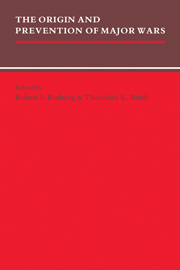Book contents
- Frontmatter
- Contents
- Introduction
- The Origins of War: Structural Theories
- The Origins of War: Explanation of Non-rational Causality
- Lessons and Analogies from Early Major Wars
- Ideology and Conflict: The Wars of the Ottoman Empire, 1453–1606
- The Origins of the Thirty Years' War
- The Origins, Causes, and Extension of the Wars of the French Revolution and Napoleon
- Lessons and Analogies from the World Wars
The Origins, Causes, and Extension of the Wars of the French Revolution and Napoleon
Published online by Cambridge University Press: 02 December 2009
- Frontmatter
- Contents
- Introduction
- The Origins of War: Structural Theories
- The Origins of War: Explanation of Non-rational Causality
- Lessons and Analogies from Early Major Wars
- Ideology and Conflict: The Wars of the Ottoman Empire, 1453–1606
- The Origins of the Thirty Years' War
- The Origins, Causes, and Extension of the Wars of the French Revolution and Napoleon
- Lessons and Analogies from the World Wars
Summary
Social scientists, philosophers, and other scholars have advanced theories on the causes of war, but many historians have found these general theories to be of only limited utility. They hold that, although such theories may help to explain war per se, they cannot explain the causations of individual conflicts, especially when such generalization may actually be counterfactual, and are used merely to impose an arbitrary and artificial plan. Even so, historians, too, have addressed the problem of causation. Competition for power, a concept dating to Thucydides, has been especially attractive. As one modern formulation puts it, war is “simply the use of violence by states for the enforcement, the protection, or the extension of their political power.”
This formulation is workable because it embraces a wide range of causations, meeting many, if not all, of Brodie's criteria that theories of causation must be “eclectic and comprehensive.” “The enforcement, the protection, or the extension” of power can be seen as not only encompassing the traditional view that war derives primarily from the primacy of external affairs, but also applying to the more recent emphasis on the role of economic interests, domestic pressure groups, and ideology. It also conforms to Clausewitz's dictum that war is but one particular kind of conflict between social groups, “a clash between major interests that is resolved by bloodshed,” which “is the only way in which it differs from other conflicts.”
- Type
- Chapter
- Information
- The Origin and Prevention of Major Wars , pp. 199 - 222Publisher: Cambridge University PressPrint publication year: 1989

